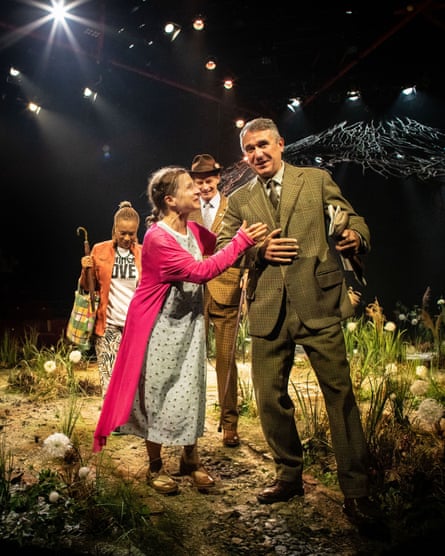Harry and Jack – distinguished-looking older chaps in well-cut check weekend suits – chat in a wild garden. One claims to be a heating salesman, the other to run a high-end jam emporium, although shifty eyes and wobbly facts encourage suspicion. They might be spies or another kind of liar, or – from their physical contrasts and feed-punchline chat – a music-hall act rehearsing. But it becomes clear they are in an institution they need permission to leave.
Premiered in 1970, David Storey’s Home was one of three hit English plays within a decade that applied to very different ends the basic model of Samuel Beckett’s Waiting For Godot: men, of contrastingly fanciful and practical personality, caught in a threatening situation while filling time with cross-talk progressing from inconsequential to ominous. The other two are Tom Stoppard’s Rosencrantz and Guildenstern Are Dead (1966) and Harold Pinter’s No Man’s Land (1975).
The Pinter and Storey are linked by their original central casting of Ralph Richardson and John Gielgud, classical theatre knights making a late-career embrace of new writing. But, although Home was staged first, it has, partly due to the shared acting history, unfairly come to seem somehow derivative of the more celebrated and revived No Man’s Land.

Josh Roche’s powerful and disturbing revival reclaims Storey’s play by homing in on its increasingly known roots in the writer’s lifelong mental illness, including periods of institutionalisation, as described in this year’s posthumously published memoir, A Stinging Delight. The varieties of patients he lists in the book – “the half-comatose figures, the bleary eyes, the shuffling feet, the indifference to food, to dress” – are all dramatised or referenced in Home.
So a script that could be seen in the past as a broader metaphor for the traps and miseries of humanity plays as painfully specific reportage, the context also changed by a more generally empathetic reception for a psychiatric subtext from which audiences 50 years ago might have flinched.
The main male duo luxuriate in Storey’s verbal wit. Jack (John Mackay), with a baffled affability, drops anecdotes about an improbable quantity of relatives (“I had a cousin who …”), while Daniel Cerqueira’s Harry has an anguished stolidity, seeming to give nothing away. At times, we could be watching Morecambe and Wise. But what punches lie under the lines?
Where Home most departs from its Stoppardian and Pinteresque similars is in the presence of a balancing female double act: apparently sweet Kathleen (Hayley Carmichael) and seemingly sour Marjorie (Doña Croll) keep us guessing through Storey’s wily withholding of why each patient is confined and doubt about the accuracy of their self-knowledge. Leon Annor maximises the impact of the smallest role of Alfred, whose mania focuses on the chairs that are the only scenery Storey asks for, although Sophie Thomas’s design boldly ignores this stage direction to conjure something like a corner of the Eden Project, all flowers, bowers and scrub.
The word “home” has resounded through the pandemic – the care premises where coronavirus spread unchecked, the houses in which people died rather than risk hospital. This welcome spotlight on a neglected dramatist (also a talented novelist and painter) is a strange but captivating portrait of those who end up in a home because their homes can’t hold them.
At the Minerva theatre, Chichester, until 6 November.

Comments (…)
Sign in or create your Guardian account to join the discussion